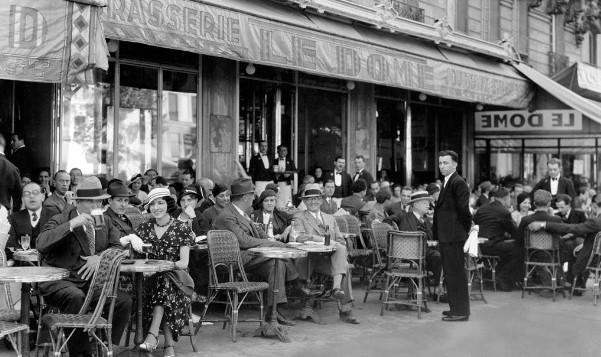How did coffee conquer the world?

、
For professional baristas, please follow the coffee workshop (Wechat official account cafe_style)
After thousands of years, coffee has created countless classics: Ethiopians discovered it; Arabs used it to make the world's first cup of coffee drink. European people enjoy coffee and read the latest periodicals to give it a strong cultural flavor. The money-hungry Brazilians got a bunch of coffee seeds in the name of love.
The Legend of Dance Goat
Ethiopia on the ancient African plateau is the hometown of coffee. More than a thousand years ago, coffee berries hung heavily on coffee trees in this tropical highland, and its color was as red as the fiery sun.
One day in the 9th century AD, the shepherd Kaadi, who awoke from his sleep, could not find his flock. He had to climb over the mountains to find the animals that had caused trouble. It may be a bad day for Kaadi, but the luckiest day for people who love coffee.
On the hillside, Kaadi finally found the sheep. These shy animals are now dancing excitedly. The surprised young man soon found that they were eating a kind of red berry. Out of hunger and curiosity, he also tasted some. After a while, he danced and joined the carnival of the sheep.
People are fascinated by the refreshing and refreshing effect of coffee. At that time, Ethiopians would swallow coffee rolls in meat to replenish their energy. The fame of magical plants soon spread to the other side of the Red Sea.
Mocha gets its name.
Across the Red Sea, Yemeni merchants brought coffee back to the Arabian Peninsula in the early 11th century, perhaps their first stop in Asia was the Yemeni port of Moka. More than a thousand years ago, it leaned in front of the mountains on the west bank of the peninsula, quietly watching the merchant ships passing by in the sun.
Yemen and Ethiopia are the first regions in the world to grow coffee, and ripe coffee fruits are transported to the port of Mocha, where merchants bargain for them. This is the earliest coffee market in the world, hence the name of the ancient and charming mocha coffee.
Arabs used these beans to make the world's first cup of coffee drink-qawhwa. Quawa is boiled with coffee beans and water, and the delicate process in the process is no longer known.
People who taste it for the first time may not like the bitterness of the mouth and the bean dregs that are hard to swallow, but the fragrance of Quawa will stay in the mouth for a long time and let people taste it slowly.
Coffee allows devout Arabs to serve Allah more attentively. It is also seen as a panacea, and depressed people become happy after drinking coffee. Coffee has conquered Arabia. It is said that the first coffee shop in the world opened in the holy land of Mecca.
In the ancient Arab world, the tradition of drinking coffee was simple and solemn. Even today, coffee is used to entertain guests from afar to express the sincere respect of Arabs. The guests' humble taste of coffee and warm praise are also the most appropriate response to the hospitable host.
The ancient Arabs took good care of the cherished coffee and forbade people to take it out of the Arab land. But a man named Babudan managed to smuggle some seeds back to India, and coffee took root in South Asia.
Landing in Europe
In 1453, the Ottoman monarch Mohamed II, known as the "conqueror", opened the door of Constantinople with a bronze cannon and renamed it Istanbul. Coffee also came to the gates of Europe with the westward army.
Some Westerners traveling to Turkey have brought back small bags of coffee beans, which many see as a panacea from the East. One doctor said that the hot drink, known as Chaube, "is almost as black as ink and is especially effective for stomach discomfort."
Coffee is quietly becoming popular in Europe. When Pope Clement VIII tasted the "black water" from the east, the fate of coffee in Europe was established. Coffee should be baptized and become a Christian drink, he declared.
In the 17th century, coffee, as a commodity, officially landed in Europe from Venice and Marseilles. It is only natural that it is popular in Europe.
The upper class of Europe is the most extravagant customer of coffee. Coffee and tea are warmly welcomed in Versailles, and Louis XV even has a small gilded stove and a tea set of the same material. The beans used to make coffee were baked by the king himself.
On the other hand, people prefer to get together in cafes, have a cup of coffee, read some of the latest periodicals, and enjoy the strong cultural flavor of the coffee.
The cafes in Europe are as innumerable as the stars in the sky. If you ask where the first coffee shop in Europe is, the Italian will say: the first coffee shop in Europe opened in Italy in 1654; the English will tell you: a Turk named Jacob opened a coffee shop in Oxford as early as 1637.
Alfred Boga once said: a cafe is like a small town full of applause and novelty in the arms of a big city. When dusk came, the concert sounded and people wandered around the cafe, which was already crowded with people. It doesn't matter whether you have a seat or not. the important thing is to share the freshness and enthusiasm.
You can hear the noise of the game crowd, or you may see young Rousseau arguing with people in a seat not far away. If time and space allow us to travel freely in it, then Rousseau's voice will not drown out the voice of the short man in front of you. In the smoke of cigars, he was impassioned and eloquent, and the people beside him would shout loudly, Napoleon Bonaparte, you speak too well.
And you push the crowd away, step aside, and see the young poet Sander Petuofi standing among his friends, reciting his new book, the Song of the Nation: get up! Home is calling, Hungarian! Now is the time to unite! At this time, you hear the noise outside the window. It was the Hungarians who rebelled against Austrian rule in 1848.
In Europe, coffee is a soup of relief, a catalyst of passion and a source of inspiration. Balzac eats nothing but coffee in order to write. Coffee is the only thing that can be absorbed in an empty stomach. It makes the mind march forward like a huge army. Inspiration is like a shooter concentrated in the position to stand by. "Human Comedy" may not be finished without coffee.
A token of love
Although they love coffee, coffee trees will not take root in Europe. Coffee trees are suitable for growth only on the land between the Tropic of Cancer. The Ottoman Empire controlled Europeans' access to oriental coffee. The hostility between the East and the West is destined to prevent Arabia from becoming the coffee garden of Europe.
At the beginning of the 18th century, Martinique Island in the Caribbean was a French dependency, and French officer Gabriel Dikrou was the infantry commander here. He got a precious coffee seedling from Louis XV's garden and brought it to Latin America. In less than two years, coffee trees flourished here.
Coffee beans grown in the New World have been sent to Europe for sale, and huge profits have made Latin America eager to take a share in the international trade in coffee.
How can I get the seeds and seedlings of coffee? The Brazilians have come up with a brilliant plan. They sent a personable Brazilian officer to French Guiana. He soon won the heart of the wife of the Governor of Guyana, who gave him a bunch of coffee branches full of fruit as a token of love. The Brazilians finally got the coffee they always wanted.
Today, countries such as Brazil, Colombia and Guatemala are rich in coffee. In the blue waters of the Caribbean, the mountains of Jamaica are covered with a faint blue veil in the sun. This is the Blue Mountain. The taste of Blue Mountain coffee is elegant and charming, but it is expensive, and it is known as "the aristocrat in coffee".
Coffee has created countless classics after thousands of years, and the noble Blue Mountain may not be known to the public, but the instant coffee invented by Nestl é in 1938 has brought coffee into a wider world.
Someone once described coffee as black as devil, hot as hell, pure as angel, sweet as love. " The charm of coffee is something like that.
Important Notice :
前街咖啡 FrontStreet Coffee has moved to new addredd:
FrontStreet Coffee Address: 315,Donghua East Road,GuangZhou
Tel:020 38364473
- Prev

Let coffee go abroad, the aggregation effect of Chongqing Coffee Trading Center is beginning to show.
Communication of professional baristas Please follow the coffee workshop (official Wechat account cafe_style) as soon as it enters the Chongqing Coffee Trading Center, the strong smell of coffee is coming, causing a lot of media representatives to move their index fingers. As soon as we entered the Chongqing Coffee Trading Center, the strong smell of coffee came to us, which attracted a lot of media representatives to move their index fingers. On the morning of June 7, Laiyu participated in the construction of inland open highlands.
- Next

The most compelling coffee in the world gathers together in the Liberation Monument, Indonesia's "indigenous" Awaker is very eye-catching.
Professional barista communication please follow the coffee shop (Wechat official account cafe_style) coffee control handsome boys and beauties in Chongqing, pay attention, welfare is coming. Starting from today (June 8), Yuanchuang Coffee Culture Festival, a lively coffee feast in Yuzhong District, will last until the end of this week, in Jiefangbei pedestrian Street (Civil Rights Road, National Road). According to the organizers of the event, this coffee
Related
- Can lightly roasted coffee beans be used to extract espresso? How finely should you grind high-quality coffee beans to make Italian latte?
- What is the difference between the world's top rose summer coffee and Yejia Shefi? What are the flavor characteristics of Yega Shefi coffee and Panama rose summer?
- The ceremony is full! Starbucks starts to cut the ribbon at a complimentary coffee station?!
- A whole Michelin meal?! Lucky launches the new "Small Butter Apple Crispy Latte"
- Three tips for adjusting espresso on rainy days! Quickly find the right water temperature, powder, and grinding ratio for espresso!
- How much hot water does it take to brew hanging ear coffee? How does it taste best? Can hot water from the water dispenser be used to make ear drip coffee?
- What grade does Jamaica Blue Mountain No. 1 coffee belong to and how to drink it better? What is the highest grade of Blue Mountain coffee for coffee aristocrats?
- What are the flavor characteristics of the world-famous coffee Blue Mountain No. 1 Golden Mantelin? What are the characteristics of deep-roasted bitter coffee?
- Can I make coffee a second time in an Italian hand-brewed mocha pot? Why can't coffee be brewed several times like tea leaves?
- Hand-brewed coffee flows with a knife and a tornado. How to brew it? What is the proportion of grinding water and water temperature divided into?

